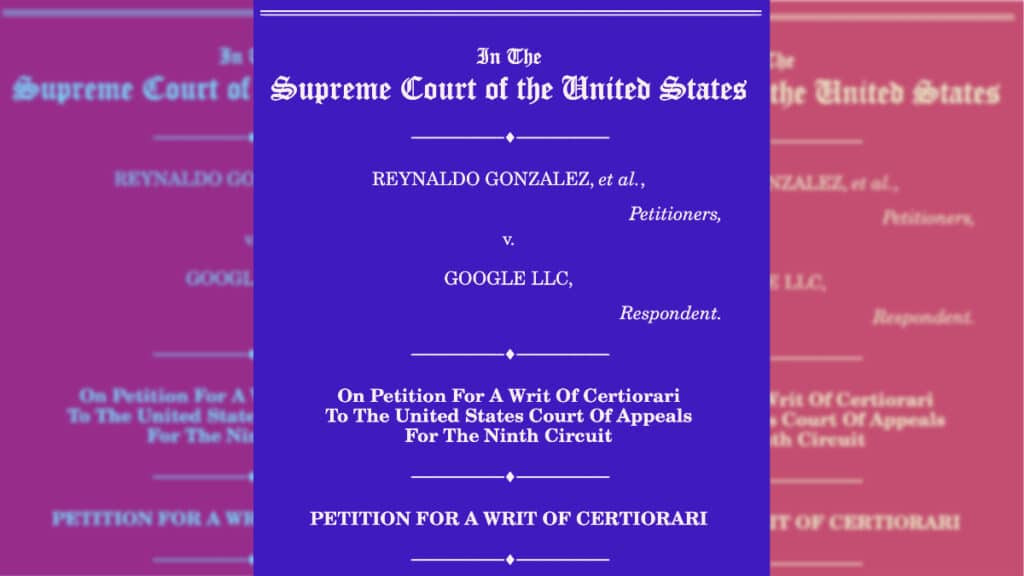Gonzalez v. Google: A Perspective from Public Knowledge
Ben Lennett / Feb 20, 2023Ben Lennett is a tech policy researcher and writer focused on understanding the impact of social media and digital platforms on democracy.
Ahead of oral arguments in Gonzalez v. Google, LLC at the Supreme Court next week, I sent a short questionnaire to gather perspectives and legal opinions of different organizations that filed briefs with the Court. It asked organizations for their perspective on the Gonzalez case, and the arguments by the Petitioner and the U.S. government that urged the Court to narrow Section 230 protections. I also asked for opinions on the Zeran v. AOL decision that largely shaped the U.S. courts’ interpretation of Section 230’s immunity protections.
Below are responses provided by John Bergmayer, Legal Director at Public Knowledge. Read Public Knowledge’s full amicus brief here.
Why does this case matter to the organization you represent?
While Section 230 is not perfect, and we believe dominant digital platforms need more oversight, Section 230 remains an important tool for facilitating free speech online. Without Section 230, speech would either be very tame and lawyer-approved, or it could turn platforms into unmoderated wastelands. Additionally, while the kinds of black box algorithms that platforms use can be concerning, it is difficult in practice to distinguish the recommendations at issue in this case from other things, such as search results. Platforms should be able to continue to offer tools to users that help them find and sort through information online.
What is your position generally on the merits of the Gonzalez case? Is Google liable if its algorithms recommend terrorist videos to users? Is it liable if it monetizes those same videos with ads?
Google should prevail on the law. Recommendations fit within even a narrow view of “publishing” in the common law sense, and it should not become liable for the content of videos because it has recommended them. Saying that the liability is for the “recommendation” itself and not the objectionable content of the video seems disingenuous since unless the video being recommended was harmful, there would be no cause of action. As a matter of policy, monetizing a video perhaps should create greater liability, but that would require statutory change. Imposing these sorts of policy preferences through creative statutory interpretation could lead to unintended consequences.
Does Section 230 immunize Google and other social media companies from liability more generally when they recommend third-party content to users?
It shields them from liability that depends on the objectionable content of third-party content. It does not shield them from liability for their own speech, for their own actions (where the asserted harm is not just another attempt to find it liable for third-party content), from privacy laws, or regulation of their business model and practices. Nor does Section 230 protect companies like data brokers that try to claim that they are free from liability when they abuse people’s personal data.
Do you agree with the Zeran v. AOL decision that strongly shaped how courts interpreted Section 230?
Zeran’s analysis of the relationship between publisher and distributor liability is correct. That said, had it gone the other way and found that distributor liability was not a form of publisher liability, I don’t think the Internet would have been imperiled. The case law likely would have developed along with the growth of platforms and come to a reasonable place. I don’t think, though, that repealing a precedent like that at this stage is wise—reform should happen through Congress.
If the court relies on the arguments in your brief to make its decision, how will it impact social media and the internet more broadly?
I hope it will point policymakers and advocates to what we feel are better approaches for platform accountability, such as a digital regulator. But in terms of how it will affect platforms immediately, the outcome we are looking for is consistent with how every appellate court has addressed the issue. Certainly, those that are arguing for the court to repeal settled precedent in the absence of a circuit split would expect more immediate changes.
Authors

